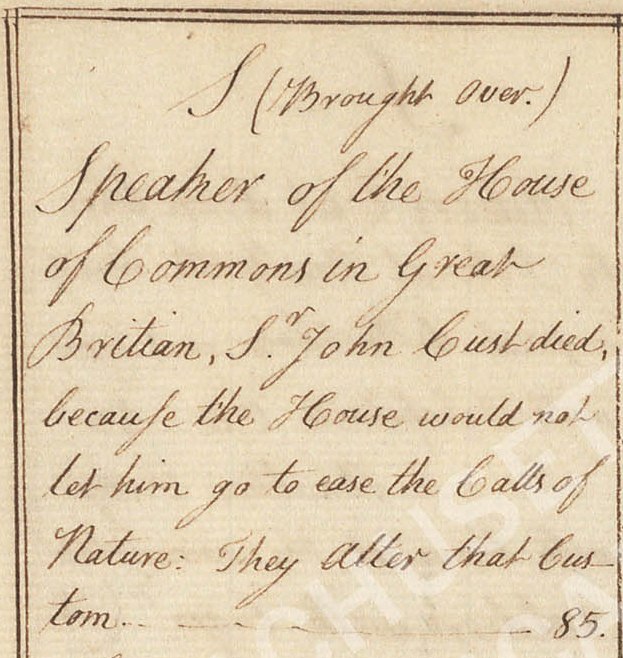By Peter Steinberg, Collection Services
The Massachusetts Historical Society (MHS) holds an important collection of Revolutionary-era newspapers assembled, annotated, and indexed by a Bostonian shopkeeper named Harbottle Dorr, Jr. The Society has just launched a digital presentation of this collection. Dorr’s index terms and annotations offer a fascinating glimpse into his perspective and reactions to events, issues, and people discussed in newspapers of his time.
On Monday, 27 August 2012, I posted on The Idiosyncratic Index Subjects of Harbottle Dorr, Jr. In that blog post, I highlighted some of the more quirky index entries from Volumes 1 and 2 of the Harbottle Dorr, Jr. Annotated Newspapers collection, and also mentioned that a second posting would be forthcoming. Were you holding your breath? The wait is over! You can exhale now.

Volume 3
Cold Water, the Pernicious effects of drinking too much in hot weather &c. 212
Dogs Mad, Symptoms of 11
Drowned Persons Recover’d 638
Earth opening & swallowing Person’s at Quebec 601
Mcdougal Capt. presented with venison (in Prison) 50
Rum Danger of drawing it by candlelight 192
Speaker of the House of Commons in Great Britain Sir John Cust died because the House would not let him go to ease the Calls of Nature; They Alter that Custom 85
Tea, Ladies of Boston sign not to drink any vid. Under Agreement 31.
Thunder Terrible, Broke on a Magazine & produced terrible Consequences. 418.
Volume 4
Auctioneer put up the Ministry for sale. 470.
America of what vast importance to Great Britain: the extent of it: will be the greatest Empire in the World: the King of Great Britain in time it’s probable will fix his empire there, & great Britain become dependant on her, &c. 148.
Denmark Queen of, imprisoned (for attempting to poison the King.) with her paramour, &c. 52.
Deposition of John Mills, respecting a Tar Barrel put on the Beacon. 328.
Goal never intended as a place of Punishment. 24.
Giant at Hingham. 194.
Gun Powder Since found out, mens lives have been preserved, & c, & c, * 891.
Herculaneum City of in Naples, discovered, after being 1700 years buried by an eruption of Mount Vesuvius. 77.
Hillsborough Lord, on his intended resignation: a miserable wretched Creature. 164
Lemmons, wine, &c: a great hardship, to oblige the Americans to enter them in England. 198.
Snow, will make Puddings in the Room of Eggs. 223.
The indexes are now all transcribed and encoded, and available on the new website (www.masshist.org/dorr). The MHS has worked hard to make it as easy to use as possible, and are confident you will find the images stunningly clear and, while Harbottle Dorr, Jr. did have very good handwriting, we hope that the transcriptions provided will be accurate and helpful.
Since I have your attention, perhaps you will allow a sidebar? We are not yet presenting on the website transcriptions of the annotations from the newspaper issues themselves, but in working with the newspapers and their digital surrogates, we noticed from time to time humorous marginal commentary. Here is one such annotation that Dorr made to a speech by “his Excellency Sir Francis Bernard,” which was published in The Boston Evening-Post from 3 June 1765. It is in Volume 1, numbered by Dorr page 95: “This Speech the House did not Answer, perhaps they did not understand it. Who could?”
Not thinking myself better than Dorr, I have endeavored to read and understand Bernard’s Speech. Bernard begins by admitting, “I have no Orders from his Majesty to communicate to you; nor any thing to offer myself but what relates to your internal Policy: I shall therefore take this Opportunity to point out such domestic Business as more immediately deserves your attention.” I take this that the gentlemen of the council were hijacked – as you are right now by me – by Bernard’s ego! The rest of the speech is on Bernard’s desire to see an increased production and export of “Pot-Ash, Hemp and the carrying Lumber to the British Markets.”
Harbottle adds another personal opinion on two of Bernard statements in this same speech:
“The general Settlement of the American Provinces, which has been long ago proposed, and now probably will be prosecuted to its utmost Completion, must necessarily produce some Regulations, which, from their Novelty only, will appear disagreeable”
and
“In an Empire, extended and diversified as that of Great-Britain, there must be a supreme Legislature, to which all other Powers must be subordinate.”
To these Dorr writes, “Now the Wolf shews himself notwithstanding his Sheeps Cloathing.”

